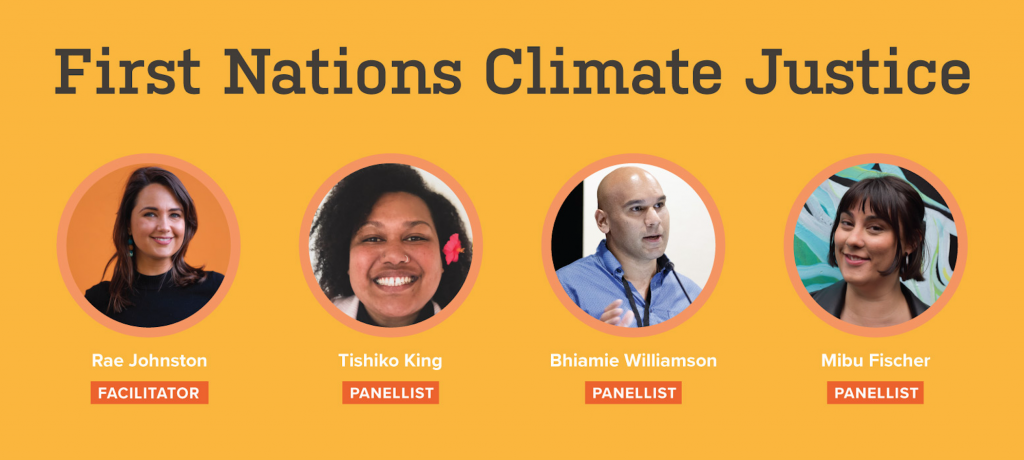Emergency Leaders for Climate Action (ELCA) is a project of the Climate Council. We are 100% independent and funded by donations from people like you. Your donation will ensure our vital work continues.
First Nations Climate Justice panel
The public panel on First Nations Climate Justice offered many insights into the climate crisis from a First Nations’ perspective: the impacts of climate change on First Nations communities, how First Nations communities are leading the fight for climate justice, how to be a good ally, traditional land and water management, and more.
The following is a written summary of a panel that was hosted online. You can read the full report here or view the discussion at the bottom of the page.
This written summary is an invitation to further explore the issues raised, and to continue listening to First Nations’ perspectives on the climate crisis. At the end of each section is a selection of resources for additional learning, and phrases highlighted throughout are further defined in the glossary. Emergency Leaders for Climate Action offers its heartfelt thanks to Tishiko King, Mibu Fischer, Bhiamie Williamson and Rae Johnston for their time and for sharing their wisdom.
Download the summary
The panel
Tishiko King
Tishiko King is a proud Kulkalaig woman from the Island of Masig, Kulkalgal Nation of Zenadth Kes. Tish is the community organiser at Seed Indigenous Youth Climate Network and Our Islands Our Home campaign. During her studies in Ocean Science on the Gold Coast, Tish became passionate and actively involved with grassroots environmental groups and rallies across Australia and overseas. With experience across different industries at CSIRO Oceans and Atmosphere and the exploration and minerals industry, Tish brings a diverse perspective of First Nations and environmental justice. With Indigenous peoples on the frontlines from the impacts and causes of climate change, Tish believes that working towards a sustainable and just future for First Nations people is a fundamental step towards solving the climate crisis.
Mibu Fischer
Mibu Fischer is a Quandamooka saltwater scientist with engagement skills for strengthening partnerships between First Nations communities and the research sector. Her specific interests are around Traditional Knowledge (science) and management practices being considered within modern day fisheries, coastal and conservation management. She joins with other Indigenous and Traditional practitioners to strengthen the global Indigenous voice and leadership in areas of marine research and coastal Indigenous livelihoods. Her goal is to bridge a gap that draws attention to the Indigenous communities facing the frontline of changes to coastlines, ecosystems and livelihoods from climate change impacts.
Bhiamie Williamson
Bhiamie Williamson is a Euahlayi man from north-west New South Wales. He is a Research Associate and PhD Candidate at the Centre for Aboriginal Economic Policy Research, Australian National University. He studied at ANU and in 2017 graduated from the Masters of Indigenous Governance at the University of Victoria, British Columbia, Canada. Bhiamie also holds graduate certificates in Indigenous Governance from the Native Nations Institute at the University of Arizona and Indigenous Trauma and Recovery Practice from the University of Wollongong. Bhiamie’s expertise includes cultural land management, cultural burning with a focus on southern temperate Australia, and the impacts of disasters on Indigenous peoples.
Rae Johnston
Rae Johnston was our facilitator for the panel event. She is a journalist, producer, editor and proud Wiradjuri woman from Dharug and Gundungurra Country in Western Sydney. Currently Rae works as a Science and Technology Editor for NITV at SBS and is the producer and host of podcasts Queens of the Drone Age, Hear+Beyond and Take It Blak.
Watch the panel
For media enquiries or interviews with ELCA members
Contact Media Manager, Jacqui Street
0498 188 528 / jacqui.street@climatecouncil.org.au
